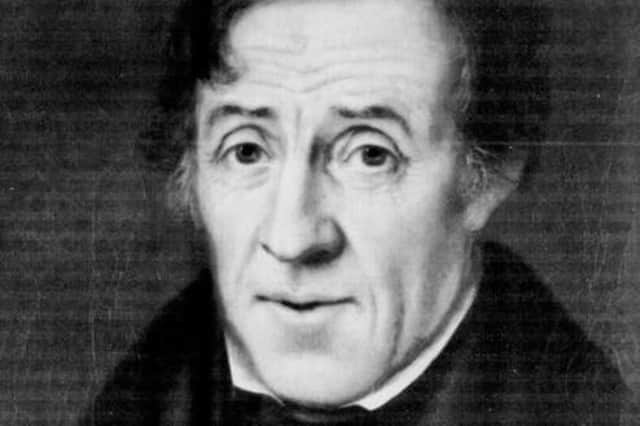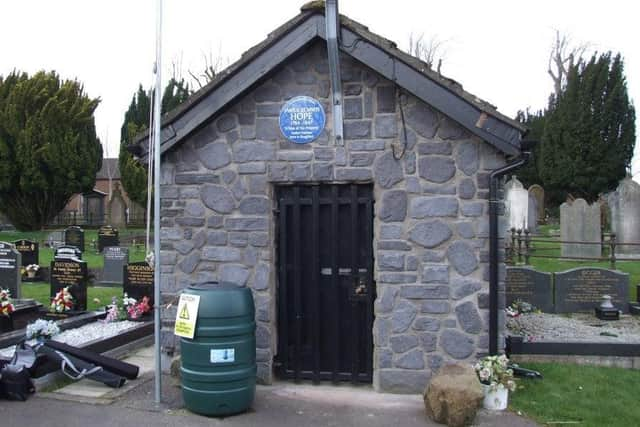Commitment of ‘The Spartan’ to the United Irishmen was unquestioned


The Society of United Irishmen was a predominantly middle-class organisation.
Jemmy Hope was the only leading United Irishman who was a working man. A hand-loom weaver by trade, he was born on August 25 1764 near Templepatrick. He was the second of the three sons of John Hope and Sarah Hope (née Speers). His father was a Scottish covenanter who presumably fled to Ulster to escape persecution in Scotland.
Advertisement
Hide AdAdvertisement
Hide AdBy his own reckoning, the young Hope received only 15 weeks of formal schooling. He was hired as labourer to William Bell, a farmer, who insisted that Hope should listen to stories from ancient Greece and Rome after the end of the day’s work. It was his love of the Bible that gave him the incentive to learn to read and write. Two other farmers, John Gibson and John Ritchy, assisted him with his education.


The American Revolution stimulated an interest in politics and he joined the Roughfort Corps of Volunteers which contributed significantly to his radicalisation. He later claimed, ‘The Volunteers of 1782 were the means of breaking the first link of the penal chain that bound Ireland’.
Although he disapproved of secret and oath-bound societies, he joined the United Irishmen in 1795 but made the very fair point that ‘oaths would never bind rogues’. Membership brought him into contact with Samuel Neilson and Henry Joy McCracken and ultimately Thomas Russell who all greatly admired his integrity and reliability. For these qualities, he acquired the nickname, ’The Spartan’.
Between 1796 and 1798 he became one of the United Irishmen’s principal organisers and recruiters. He was active in several counties in southern Ulster, Leitrim and Roscommon in Connacht and Kildare and Wicklow in Leinster. He also recruited in the Liberties in Dublin.
Advertisement
Hide AdAdvertisement
Hide AdAlthough on his own admission he was a poor public speaker (and perhaps he protested too much), he is usually credited with being very successful. In Co Armagh he was allegedly successful in bringing the Catholic Defenders into the movement and reconciling them with the Peep O’Day Boys, their Protestant rivals. However, a degree of scepticism would seem appropriate. Certainly, the events of 1798 would tend to corroborate scepticism.
Whether he succeeded or failed, Hope’s enthusiasm and commitment are not in doubt. He was profoundly disappointed that many of the wealthier members of the United Irishmen, notably Robert Simms, were reluctant to rise without assurances of French intervention – whom he would later scathingly refer to them as the ‘foreign aid men’ – and were unwilling to take risks for the cause. Hope thought that ‘it would ill become one, who has pledged his life to his country, to shrink from death in any shape’.
At the Battle of Antrim on June 7 1798 he was to the forefront as Henry Joy McCracken’s right-hand man. He had assembled his detachment of weavers and labourers at Craigarogan Rath and led them into Antrim, singing the ‘Marseillaise’. When defeated by General Nugent, Hope and McCracken tried to rally the insurgents but to no avail. Hope’s ‘Spartan Band’ distinguished themselves in covering the retreat.
Hope and McCracken went into hiding, first on Slemish and then in the hills above Belfast. Unlike McCracken, Hope evaded capture and stayed in hiding until November.
Advertisement
Hide AdAdvertisement
Hide AdHope greatly admired McCracken: ‘When all our leaders deserted us, Henry Joy McCracken stood alone, faithful to the last …’. This endeared him to McCracken’s formidable sister, Mary Ann.
Coming out of hiding, Hope tried to revive the United Irish movement in Antrim and Down and then in Dublin.
Hope and Thomas Russell were asked by Robert Emmet to raise Ulster for his rebellion in 1803. Hope was given responsibility for raising Antrim and Russell Down. As in 1798, they found limited enthusiasm for a rebellion without a French invasion. He claimed the greatest enthusiasm they encountered was among ‘the lowest orders of Catholicks’, inflamed by Orange harassment.
Emmet’s rebellion in Dublin was a fiasco. Russell raised the standard of revolt in Ulster at Buck’s Head dolmen, near Loughinisland, Co Down. The response was pitiful. Russell was hanged at Downpatrick in October 1803. Hope was fortunate to escape the fate of Russell and believed his distrust of the middle-class element of the movement largely accounted for his success in avoiding arrest.
Advertisement
Hide AdAdvertisement
Hide AdIn 1806 Hope was able to return to Belfast where he worked as a weaver for the McCrackens and later, having learned to keep accounts, as a clerk for Joseph Smyth, publisher of the Belfast Almanac.
Alth ough not an uncritical admirer of Daniel O’Connell, in the 1840s Hope chaired Repeal meetings. With the advent of the Famine, he deplored the absence of men of the stamp of McCracken, Neilson, Russell and Emmett who could perhaps have harnessed popular discontent to political ends.
Through Mary Ann, R R Madden, the historian of the United Irishmen, met Hope. They became firm friends and Hope wrote his Memoirs in 1843 at Madden’s request.
Hope died on February 10 1847, aged 83, and was buried in Mullusk graveyard. His headstone, erected by Mary Ann McCracken, proclaims that Hope was ‘one of Nature’s noblest works, an honest man’.
Advertisement
Hide AdAdvertisement
Hide AdMadden describes him as ‘a poor mechanic, self-taught and self-ennobled’. When he was 80, Madden tells us he was of medium height, ‘his frame slight but compact, his features remarkable for the tranquillity and simplicity of their expression ... he is always in good humour, gay without levity ... strictly moral, utterly fearless, inflexible and incorruptible’.
James Hope’s death mask and portrait are in the Ulster Museum.
The historian A T Q Stewart thought Hope ‘a very remarkable man, a pioneer socialist before socialism had been articulated as a political creed’. ‘Remarkable’ but whether Hope was or was not a socialist provides rich material for controversy. Much depends on one’s understanding of what constitutes socialism. For obvious reasons, his political thought owed more to Robert Owen, ‘the Father of British Socialism’, than to an obscure German called Karl Marx who had yet to publish ‘The Communist Manifesto’.